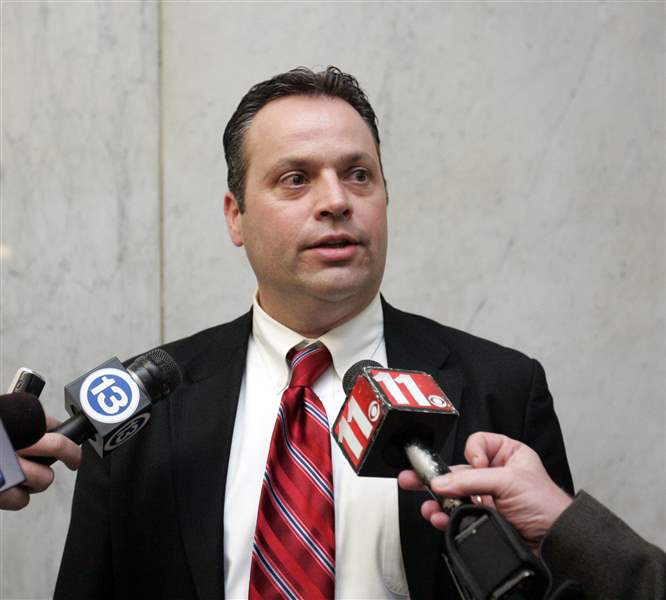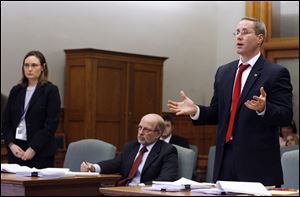
Police officers denied bid to block givebacks
4/1/2010
Police union leader Dan Wagner plans a special meeting.
Jetta Fraser
Toledo officials are poised to move forward with forced givebacks against the city's unions today after the Toledo Police Patrolman's Association failed to stop the city from imposing the cuts.
A Lucas County Common Pleas judge yesterday denied the police union's request for a temporary restraining order, saying that the issue was one for the State Employment Relations Board
Although Judge James Jensen said the court did not have jurisdiction over the issue, he said that he did not believe the union provided “clear and convincing evidence” that a temporary restraining order would serve the best interest of the public.
After the hearing, Jen Sorgenfrei, Mayor Mike Bell's spokesman, said the compensation cuts approved Tuesday by council would be implemented today.
“At this point yes, the mayor signed the legislation and that is the active date listed in the ordinance,” Ms. Sorgenfrei said.
The police union filed the 13-page complaint just before noon.

Police union leader Dan Wagner plans a special meeting.
At issue was whether the city could impose cuts on union members, including forcing union employees to pay the 10 percent share of their pension contribution and make contributions to their health-care costs, based on a sliding salary scale.
The union argued that the contract does not allow the city to “reopen and/or in any way to unilaterally modify, alter, or change” the collective bargaining agreement and that the city violated the law when it refused to arbitrate a grievance filed Tuesday.
The union further argued that if the givebacks go through, officers would suffer irreparable harm.
“Currently, many Toledo police officers live paycheck to paycheck. Eliminating [pension pickup,] coupled with increased health-care costs, will result in the financial ruin of many patrol officers, causing personal bankruptcies, home foreclosures, and requiring officers to remove children and change schools in the middle of the year,” the complaint said.
City attorneys responded that City Council voted to impose “exigent circumstances” because the city could not meet its financial obligations. In doing so, the city admits that it is breaking the union contracts.
“We can not meet our obligations under the contract. … Therefore, we had to break the collective bargaining agreement,” said Ellen Grachek, a city attorney and a former Toledo City Council member.

Representing the city of Toledo in the court hearing are Ellen Grachek and Donald M. Collins, seated, while Donato Iorio, who represents the police patrolmen's union, addresses the judge.
Ms. Grachek told Judge Jensen that 125 layoff notices are “on the mayor's desk,” and that they would have to be implemented if the city was unable to balance its budget.
“This is serious,” she said in response to union statements that the city was not in a financial crisis.
“This is not an issue of disrespecting or playing games with the police officers that keep our streets safe,” she said.
City Council approved the compensation cutbacks Tuesday, as well as a increase in the trash fee and a decrease in the tax credit for Toledo residents who work in another city and pay income taxes to both communities.
Collectively, the spending plan reduced a $48 million deficit and turned it into a $487,000 surplus, according to city officials.
Judge Jensen said the city acknowledged unilaterally changing the unions' contracts and so the issue became an “unfair labor practice” complaint.
He said other cases that the Ohio Supreme Court has ruled on indicated that unfair labor practice issues are determined by the State Employment Relations Board.
The union's attorney, Donato Iorio, said after the hearing that the union would “evaluate our legal options.”
He said that ultimately the union would do “everything we can to protect our contract.”
“We're extremely disappointed in the ruling,” Mr. Iorio said.
Union President Dan Wagner said he will call an emergency meeting for the union members to explain the court's ruling.
Another court hearing on the matter was scheduled for April 19.
If the union were to challenge the city through the State Employment Relations Board, it would have to file a complaint claiming the city violated the contract. The city would have to prove that it did so because of legitimate exigent circumstances.
At a news conference later, Mayor Bell said he was pleased with Judge Jensen's ruling.
“The judicial system upheld our request for exigent circumstances, which from my standpoint as mayor, is a great thing because we don't want to lay off police officers, he said.
Mr. Bell declined to comment on the judge's decision that the issue was not within the court's jurisdiction but instead should go to the state.
Other unions affected by the cuts include the Toledo Police Command Officers Association, Toledo Fire Chiefs Association, AFSCME Local 7, and AFSCME 2058.
The cuts will not be imposed on Toledo Firefighters Local 92, with whom the city has reached a memorandum of understanding that calls for $3 million in concessions.
Council also postponed action on the Teamsters' exigent circumstances for two weeks as the two sides discuss possible agreements.
Council members also voted to eliminate pension pickups and increase health-care costs for nonunion employees.
Staff Writer Ignazio Messina contributed to this report.
Contact Erica Blake at:eblake@theblade.comor 419-213-2134.